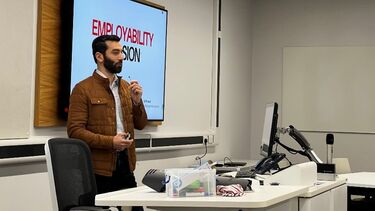The impact that Sky has on people’s lives is very apparent, and being part of that is a privilege.

Why did you decide to study MSc Information Management?
I’ve always been interested in how data and information can be structured, analysed, and used to solve real world problems. My background in computer science gave me the technical basis, but I also wanted to expand beyond just coding and software development. I wanted to understand how information flows within organizations, how it influences decision making, and how it can be optimized for better outcomes. Information Management was the perfect blend of technology, business, and human interaction. Specifically, the modules in Information Retrieval, Information Visualization, and User-Centered Design were particularly interesting to me because they combined technical skills with an understanding of how people engage with data. For example, during my dissertation, I developed a tool that analysed food recipes for greenhouse gas emissions and suggested alternative ingredients, which showed how information management can contribute to sustainability. This mix of technical problem solving and social impact is what drove me to pursue this field.
Why did you decide to study in the UK?
The UK has a strong reputation for higher education, especially in fields like information science and technology. Universities here emphasize research, industry collaboration, and practical learning, which was important to me. I didn’t want just theoretical knowledge, I wanted to work on real world projects and develop solutions that could have an impact. Another big factor was the opportunity to study in an international and diverse environment. The UK attracts students from all over the world, and I knew that interacting with people from different backgrounds would challenge my perspectives and improve my problem-solving skills. Additionally, UK universities focus on independent learning and critical thinking, which I felt would prepare me better for a career where innovation and adaptability are key. The decision was also influenced by the fact that UK degrees are highly respected globally. I knew that a master’s degree from a top UK university would open doors for me in the job market, both in the UK and internationally.
Why did you decide to study your course at the –°≈∑ ”∆µ of Sheffield?
–°≈∑ ”∆µ stood out to me for a few reasons. Firstly, it is one of the best in the UK for information management and data science, consistently ranked among the top institutions in this field (according to the QS World –°≈∑ ”∆µ Rankings by Subject 2025). I wanted to be part of a university that not only had a strong academic reputation but also had a research-driven approach to solving real-world problems. Another big factor was the structure of the course. The modules were exactly what I was looking for‚Äîcovering everything from information retrieval to data visualization and user-centred design. I also liked that the program was not just about theory; there was a strong focus on practical applications, which became clear when I worked on my dissertation project developing a tool to analyse food emissions.
Beyond academics, Sheffield as a city was also a great fit. It’s known for being student-friendly, affordable, and welcoming. The university’s strong support system for international students and its emphasis on employability also reassured me that I was making the right choice.
How was your experience of studying your course with us?
Studying Information Management at the –°≈∑ ”∆µ of Sheffield was a great experience, both academically and personally. The course was well-structured, blending theoretical concepts with practical applications, and the professors were highly knowledgeable and supportive. One of the highlights was working on my dissertation. My project focused on analysing food recipes for their greenhouse gas emissions and suggesting lower-impact ingredient alternatives. The modules were also diverse and engaging. For example, in Information Visualization for Decision Making, we explored how data can be presented in intuitive ways, and in User-Centered Design and Human-Computer Interaction, we learned about designing digital interfaces that prioritize user experience. The hands-on projects in these modules gave me real-world skills that I used professionally. The learning environment was also exceptional. The school had a collaborative and international atmosphere, which made discussions in class really insightful. I also appreciated the industry connections, where the university organized networking events with professionals from tech companies, which helped me understand how information management is applied in different sectors. Outside of academics, Sheffield as a city was a great place to live and study. The campus facilities were modern, the libraries had all the resources I needed, and the student community was welcoming. Overall, my experience was extremely positive, and I left the program feeling well-prepared for a career in information and technology.
Did you participate in any work experience opportunities during your time here?
One of the most valuable work experiences I had was my role as a Data Visualization Developer and Research Assistant at the –°≈∑ ”∆µ of Sheffield, in collaboration with Ferrio, a tech company specializing in automation software. My task was to develop an interactive visualization tool to represent complex automation workflows, which are typically difficult to interpret using standard methods. To achieve this, I used D3.js, a powerful JavaScript library for creating dynamic and interactive data visualizations. The project involved designing graphs within Ferrio‚Äôs automation platform, making it easier to understand and optimize business operations.
A highlight was receiving direct testimonials from Ferrio’s co-founder, who emphasized how my work opened new opportunities for their business. This experience played a crucial role in shaping my career by strengthening my data visualization and software development skills. It gave me hands-on experience in working with real-world datasets, collaborating with industry professionals, and designing user-friendly visual tools. The technical and problem-solving skills I gained from this project made me more confident in tackling complex data challenges, ultimately helping me secure my current role as a Software Engineer.
Did you get involved in any other activities?
I was actively involved as a Student Ambassador for the –°≈∑ ”∆µ of Sheffield. In this role, I engaged with prospective students by answering online queries, contributing to open days, and creating digital content to showcase student life and the academic environment at Sheffield. One of my key contributions was shooting and editing a video tour of the university‚Äôs most iconic buildings, which helped prospective students get to know more about their campus. Additionally, I created an infographic video about librarians in the UK using Canva and wrote a blog post reflecting on the User Researcher Industry (URI) day. This experience significantly improved my communication, as I had to explain concepts clearly and concisely to a diverse audience. It also strengthened my content creation and storytelling abilities, which have been valuable in my career, particularly when presenting ideas to different audiences. Beyond career benefits, the role helped me develop confidence, adaptability, and a sense of community, making my time at Sheffield even more rewarding.
Can you tell us about your career path since graduating?
When I graduated from the –°≈∑ ”∆µ, I started applying to graduate schemes in domains like software engineering, information management, and data science. Eventually, I got accepted in the Software Engineering graduate scheme at Sky. Since joining, I have been promoted to associate developer, and then mid level developer.
In my current role, I work on maintaining and adding features to the Sky Sports website. I am part of an agile team and we follow the SCRUM methodology. Typically, we start off the day with a daily standup, a 15 minute call where the team members share their progress on the work they’ve been working on and talk about any blockers. We then work on implementing new features on the site either individually or by pairing/mobbing. Some of these features include live updating football scores and web based video streaming. One of the projects I’m currently involved in is setting up new streaming capabilities on the Sky Sports UK and German website.
I enjoy the software development aspect of the job quite a bit, particularly finding solutions to business challenges as well as optimising existing software, and these are a big part of what I do. I also value being able to work on large projects that are used by millions of customers in different countries. The impact Sky has on people’s lives is very apparent and being part of that is a privilege. On a personal note, I like that you can work on self development and you’d only need a computer to do so.
Why did you decide to look for a job in the UK?
I decided to look for a job in the UK because it is renowned for being a global leader in technology, innovation, and research, with a thriving tech industry that is constantly evolving. The UK is home to some of the world’s most influential tech companies, start-ups, and research institutions, all of which create an exciting environment for software engineers. Moreover, the UK’s commitment to research and development, along with its growing focus on sectors like AI, machine learning, and sustainability, aligns with my long-term career goals. The chance to be part of a community that encourages creativity, collaboration, and interdisciplinary work is something I’m truly excited about.
On a more personal note, my wife and I both love the UK for its rich culture, vibrant cities, and high quality of life. We have always been drawn to its blend of traditional and modern influences, and we are excited by the prospect of making it our home. The professional opportunities here are incredibly appealing, but the personal growth and cultural diversity are equally important to us.
What can students do to secure a job like yours in the future?
Most jobs in my domain, nowadays, focus on hiring someone who can stand out and have an impact. It is therefore important to build your profile while you are still studying. I would recommend that you not only focus on getting good grades, but rather on making connections, having extracurricular activities, and part time work if you can. All this can be very helpful to make you stand out when applying to your job.
Technically speaking, try to gain as much knowledge as possible by practicing the skills that are relevant to the job that you’re looking for, for example by doing your own personal projects and building your portfolio. In addition to technical skills, networking is a key factor. I found that attending career events, connecting with professionals on LinkedIn, and participating in relevant tech events and conferences were important ways to build connections. It’s not just about applying for jobs; it’s about getting noticed by the right people.
As for how my course and experience impacted my career success, I’d say they played an important role. My MSc in Information Management provided me with both the technical skills and the problem-solving mind set I needed to succeed in the tech industry. It was also my main entry point into the job market, as it provided me with the opportunity to gain valuable experience and insights by working with an industry partner as a research assistant.
Can you describe your experience as an international student studying in the UK?
My experience as an international student in the UK has been both exciting and challenging. Moving to a new country meant adjusting to a different education system, culture, and way of life, but it also provided invaluable opportunities for personal and academic growth. The UK’s diverse and inclusive environment made me feel welcome, and I was able to connect with people from all over the world, which enriched my experience.
Academically, the –°≈∑ ”∆µ of Sheffield offered a dynamic learning environment that encouraged critical thinking and independent research. I appreciated the emphasis on practical experience, especially on my course, which allowed me to work on projects that directly applied to industry needs. The professors were approachable and supportive, always willing to guide and challenge me in my academic pursuits.
Outside of academics, I found the UK to be an amazing place for exploring new cultures and ideas. The opportunities for networking, attending career events, and engaging with industry professionals were invaluable. At times, it was tough managing the pressure of being far from home, but the university’s support services and a strong community of fellow international students made it easier.
What are your fondest memories of your time at the –°≈∑ ”∆µ of Sheffield?
I particularly enjoyed meeting different people there, especially when doing small initiatives such as the ones we did as part of the student ambassador program. I also enjoyed working at the student’s union where I got to meet some great people and have fun. I remember watching the peregrine falcons take care of their little ones and getting on the paternoster in the arts tower!
Here are my top three pieces of advice for prospective students thinking about studying Information Management at the –°≈∑ ”∆µ of Sheffield:
Be prepared for a challenging, but rewarding experience
The UK education system may be different from what you're used to, especially if you're coming from a system that‚Äôs more exam-focused. At the –°≈∑ ”∆µ of Sheffield, there‚Äôs a strong emphasis on independent learning, critical thinking, and research projects. Be ready to manage your time well and take ownership of your learning. It can feel overwhelming at first, but the support from professors and the –°≈∑ ”∆µ‚Äôs resources will help you succeed. Don't hesitate to ask for help when you need it, and take advantage of all the support services available.
Engage in extracurricular activities and networking
–°≈∑ ”∆µ offers many opportunities to get involved beyond your studies. Join student groups, communities, attend career events, and connect with professionals through university events. These experiences not only enrich your academic journey but also help you build a network and gain insights into the industry. It‚Äôs important to make connections with people in your field, especially as an international student, to open doors for career opportunities.
Embrace the cultural experience
Studying abroad is a unique opportunity to experience life in a different country. Don’t just focus on academics, take time to explore the UK, engage with people from different backgrounds, and immerse yourself in British culture. This will enhance your overall experience and help you feel more comfortable in your new environment.

Postgraduate online open day
Become part of our community of talented postgraduate taught students. Register now to join us at our online open day on Wednesday 30 April 2025.



